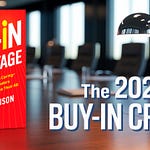Those words came from Oli Johnson, a successful tech entrepreneur who had built everything most leaders spend their entire careers chasing. Multi-million dollar business. Financial freedom. Geographic independence. The respect of his peers.
From every external measure, he was winning at life.
But sitting in that airplane seat, flying back to London for another week of back-to-back hell—board meetings, investor pitches, crisis management—he found himself staring out the window with a thought that terrified him:
If this plane goes down, I honestly don't care.
The Leadership Lie We're All Living
Here's the uncomfortable truth about modern leadership that no one wants to acknowledge: External success and internal fulfillment have become completely disconnected.
We're living in an era where leaders are more "successful" than ever—and more miserable than ever. Where the very behaviors that drive business results are the same ones that are quietly destroying the humans behind the businesses.
In my latest podcast conversation with Oli, we peeled back the layers of what I call "The Perfection Trap"—the dangerous belief that if you just achieve enough externally, you'll somehow feel fulfilled internally.
It's a lie. And it's killing leaders.
The $1 Trillion Problem Hiding in Plain Sight
The World Health Organization estimates that burnout costs the global economy over $1 trillion annually. But that's just the financial cost.
The human cost? Immeasurable.
Consider these statistics:
87% of executives report feeling like imposters
76% of leaders report feeling overwhelmed daily
67% hide their stress from their teams
High-performing leaders are 3x more likely to experience severe burnout
We're not just dealing with individual suffering—we're dealing with a systemic epidemic that's rippling through organizations worldwide.
But here's what makes Oli's story different: He didn't just survive the breakdown. He used it as the foundation for breakthrough.
The Culture Mirror: How Your Stress Becomes Their Stress
One of the most powerful moments in our conversation came when Oli realized something that fundamentally changed how he leads:
"Culture is not about writing values on a board and walking away. It's about how you're showing up."
Think about that for a moment. Every late-night email you send. Every weekend you work. Every time you say "I'm fine" while clearly struggling. Your team is watching. Learning. Mirroring.
As leaders, we're not just managing businesses—we're architecting human experiences. We're not just setting strategy—we're defining what "normal" looks like for dozens, hundreds, sometimes thousands of people.
The question that should keep every leader awake at night: What culture am I unconsciously creating through my behavior?
The Prevention Revolution: Why Early Warning Beats Recovery
Here's where Oli's story takes a fascinating turn. Instead of just recovering from burnout, he decided to solve the systemic problem. His company, PrescribedLife.AI, represents something revolutionary in executive wellness: prevention over recovery.
Using AI and biomarker data—heart rate variability, sleep patterns, genetic markers—the platform can predict burnout weeks before it hits. Imagine having a early warning system for your mental and physical health the same way you have alerts for your business metrics.
As Oli put it: "Prevention is 100% better than trying to restore your health."
This isn't just about individual wellness. This is about building sustainable leadership for the long game.
The Strategic Alternative to Hustle Culture
The most dangerous myth in modern leadership is that success requires sacrificing your humanity.
The old paradigm: Work harder, sleep less, push through, fake it till you make it.
The new paradigm: Work strategically, build systems, prevent breakdown, lead authentically.
Oli shared something that stopped me in my tracks: "I had a five-year plan to build and exit. Despite it being a five-year plan, I treated it like a sprint rather than a marathon. That's unsustainable."
The revelation: Treating every business challenge like an emergency creates a culture of perpetual crisis. And perpetual crisis is the breeding ground for burnout.
The Technology of Self-Awareness
What excites me most about Oli's work is how it bridges ancient wisdom with cutting-edge technology. Heart rate variability—a metric that reveals stress levels and recovery capacity—has been understood intuitively for thousands of years. Now we can measure it with scientific precision.
The combination is powerful:
Ancient wisdom provides the framework for sustainable living
Modern technology provides the data for informed decisions
Human coaches provide the accountability for lasting change
This isn't about replacing human connection with technology. It's about using technology to enhance human awareness and connection.
Three Questions Every Leader Must Answer
After this conversation with Oli, I'm left with three questions that every leader needs to honestly confront:
1. What external success are you using to avoid looking at your internal reality?
We use achievement like a drug. Hit the next milestone, close the next deal, reach the next level—maybe then we'll feel successful. But external validation is an addiction with diminishing returns.
2. How is your current leadership style unconsciously shaping your team's culture?
Your behavior is your team's permission structure. If you work weekends, they will too. If you skip meals, they'll normalize that. If you ignore your wellbeing, you're teaching them that humans are expendable resources.
3. What early warning systems do you have in place to prevent burnout before it destroys what you've built?
Most leaders have sophisticated systems for tracking revenue, customer satisfaction, and market trends. But no system for tracking their own human sustainability. That's not just irresponsible—it's strategically naive.
The Path Forward: Prevention as Competitive Advantage
The future belongs to leaders who understand that sustainable high performance is the ultimate competitive advantage.
While your competitors are burning out their teams, you're building anti-burnout cultures that attract and retain top talent.
While your competitors are making desperate decisions from exhaustion, you're making strategic decisions from clarity.
While your competitors are treating symptoms, you're preventing problems.
This isn't just about being a "nice" leader. This is about being a strategic leader who understands that human sustainability drives business sustainability.
A Personal Reflection
Oli's story forced me to confront my own relationship with success and suffering. How many times have I worn exhaustion like a badge of honor? How many times have I confused being busy with being effective?
The hardest question: How many people in my sphere of influence have I unconsciously given permission to sacrifice their wellbeing for external achievement?
This conversation reminded me that leadership isn't just about building businesses—it's about building humans. And humans who are thriving build better businesses than humans who are surviving.
What Happens Next
If this resonates with you, here's what I invite you to consider:
Examine your culture: Ask your team how your behavior affects them. Be prepared for uncomfortable truths.
Implement prevention systems: Start tracking one biomarker—sleep, heart rate variability, or stress levels.
Connect with like-minded leaders: Join a community where you can be honest about the challenges of leadership without judgment.
The goal isn't perfection. The goal is awareness. Self-aware leaders build self-aware organizations. And self-aware organizations are the ones that will thrive in an increasingly complex world.
Resources for the Self-Aware Leader
🔗 Oli's Platform: PrescribedLife.AI - Executive wellness platform using AI and biomarker data
🤝 Connect with Oli: LinkedIn
💬 Join the Conversation: The Self-Aware Leader's Inner Circle - Where successful leaders discuss the challenges we're all facing but rarely talk about openly.
📧 Weekly Insights: Subscribe to The Self-Aware Leader's Playbook for practical frameworks on sustainable leadership.
What's your biggest leadership challenge that no one talks about? Reply to this email—I read every single one and often respond personally.
If this article resonated with you, please share it with another leader who might need to hear this message. Sometimes the most powerful thing we can do is help someone else feel less alone in their struggle.













Share this post